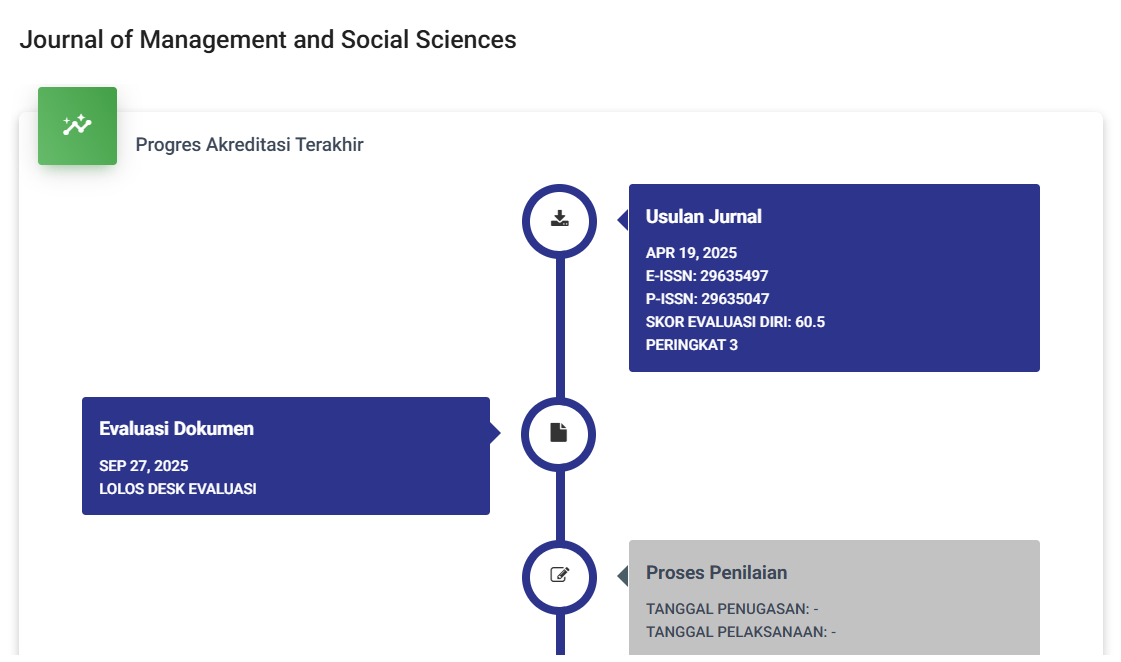Pengaruh Efikasi Diri dan Pengetahuan Manajemen Keuangan Bisnis Terhadap Intensi Berwirausaha
DOI:
https://doi.org/10.55606/jimas.v2i2.1117Keywords:
Self-Efficacy, Management Knowledge, Entrepreneurial Intentions.Abstract
Abstract Main problem: the influence of self-efficacy and business financial management knowledge on entrepreneurial intentions. Objective: to determine and analyze the influence of self-efficacy and business financial management knowledge on entrepreneurial intentions. Originality: the influence of self-efficacy and business financial management knowledge on entrepreneurial intentions. Method: this exploration is quantitative and is applied due to the influence of two or more factors explicitly when building a relationship. Results: self-efficacy has a positive and extraordinary impact on the desire for entrepreneurship. Knowledge of financial management influences the desire for entrepreneurship in central java.
References
Ahmed, I. (2021). Predicting entrepreneurial intentions through self-efficacy, family support, and regret: A moderated mediation explanation. Journal of Entrepreneurship in Emerging Economies,.
Akhter, A. (2020). Influential factors of social entrepreneurial intention in Bangladesh. The Journal of Asian Finance, Economics and Business,.
Alsharari, N. M. (2019). IMAR Indonesian Management and. Accounting Research Accounting for Bad Debt and Uncollectible.
Bandura, A. (1997). Self Efficacy – The Exercise of Control (Fifth Printing,. 2002).
Bandura, A. (2012). Self-Efficacy, The Exercise of Control.
Brigham, E. F. (2019). Fundamentals of Financial Management. Cengage Learning.
Deci, E. L. . & R. R. M. (2012). Motivation, personality, and development within embedded social contexts: An overview of self-determination theory. Oxford University Press.
Lent, R. W. (2013). Social cognitive model of career self-management: Toward a unifying view of adaptive career behavior across the life span. Journal of Counseling Psychology,.
Liadi, F. N. (2019). Pengaruh dukungan pendidikan, sikap dan efikasi diri terhadap intensi kewirausahaan pada mahasiswa semester satu. Jurnal Manajerial Dan Kewirausahaan.
Nawu, A. Z. R. (2023). Pengaruh Adversity Quotient, Efikasi Diri, dan Need For Achievement Terhadap Intensi Berwirausaha Mahasiswa.
Niu, H. J. (2010). Investigating The Effects Of Self-Efficacy On Foodservice. Industry Employees’ Career Commitment. International Journal Of. Hospitality.
Nurul, I. & R. R. (2008). Intensi Kewirausahaan Mahasiswa : Studi perbandingan antara Indonesia.
Pajares, F. (2019). Self-efficacy beliefs in academic settings. Review of Educational Research,.
Ross, S. A. (2018). Corporate Finance. McGraw-Hill Education.
Santrock, J. W. (2007). Perkembangan Anak.
Schwarzer, R. & J. (2018). The general self-efficacy scale (GSE). In J. M. John & E. Diener (Eds.), Assessing well-being: The collected works of Ed Diener (pp. 345-357). Springer.
Taruli, S. (2020). Intensi Berwirausaha : Sebuah Konsep Dan Studi Kasus Di Era Revolusi Industri 4.0.
Urban, B. (2020). Entrepreneurial alertness, self-efficacy and social entrepreneurship intentions. Journal of Small Business and Enterprise Development.
Downloads
Published
Issue
Section
License
Copyright (c) 2023 Heni Dwi Listyaningrum, Henny Kumalasari Widodo , Sulartopo Sulartopo

This work is licensed under a Creative Commons Attribution-ShareAlike 4.0 International License.








